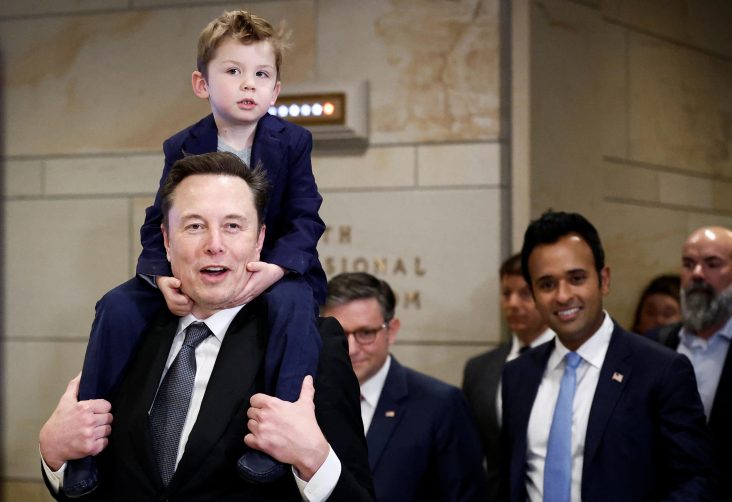Ashington This week, billionaire disruptors Vivek Ramaswamy and Elon Musk appeared together on Capitol Hill to tout their cost-cutting credentials, to a mixed response from cautious Democrats and occasionally ebullient Republicans.
Some Democrats, including Sen. John Fetterman of Pennsylvania, were concerned that President-elect Donald Trump was giving two foxes access to the regulatory henhouse by appointing Musk and Ramaswamy to his Department of Government Efficiency, while GOP House members were confident about conflict of interest issues.
Rep. Lloyd Smucker, R-Pa., stated Thursday that he was “quite excited about it” in reference to the nongovernmental panel that is tasked with identifying efficiency and cost savings in Washington.
Make a better start to the day. Every morning, receive all the news you require in your inbox.
Musk and Ramaswamy circled the Capitol for private meetings with the elected officials they will need to implement their final recommendations, surrounded by reporters and congressional staff. The two billionaires have also brought attention to the issue of ending most remote work at government agencies, which was the focus of a report released on the occasion by Sen. Joni Ernst, R-Iowa, who is the chair of the Senate’s new DOGE Caucus.
Concerns about conflict
Both Ramaswamy, a financier, and Musk, the richest man in the world, will be in a position to propose regulatory changes and budget savings that will benefit their businesses, according to some government officials, ethical experts, and Trump opponents.
Rep. Hank Johnson, D-Ga., remarked of Musk, “It’s unfortunate if he cuts the government’s ability to protect the public so that he can make a few extra dollars, because there’s so much regulation involved in his many interests.”
House Republicans dismissed the possibility of conflicts and stated that Musk and Ramaswamy’s combined commercial success will help streamline the large federal government.
Rep. Tom Cole, R-Okla., stated that there is “no reason to doubt the integrity of either one of these individuals.” The House Appropriations Committee, of which Cole is chairman, makes financial decisions for the government. “I hold them both in the highest regard.”
“My best advice to you is, if you’re evaluating somebody’s advice, you got to look at whatever their self interest is in evaluating that advice, right?” Ramaswamy recently stated this in Washington, D.C., at the Aspen Security Forum. “That includes me.”
Both Musk and Ramaswamy own large stakes in businesses and sectors that are subject to federal regulation.
With a net worth of nearly $343 billion, Musk owns a number of businesses that are subject to federal regulation, have federal contracts, or get federal subsidies. The corporation has been sued several times for sexual harassment, and Musk was sued by the Justice Department in 2022 for allegedly discriminating against refugee job applicants. In 2018, he was compelled to resign as Tesla’s board chairman in order to settle federal securities fraud allegations.
DOGE is the abbreviation that Musk and Trump are using to refer to their “department.” It is pronounced similarly to Dogecoin, a cryptocurrency that Musk has long backed. Since Trump established the department, Dogecoin’s value has increased by around 70%.
Musk and Ramaswamy “will work together slashing excess regulations, cutting wasteful expenditures, and restructuring federal agencies,” according to a prior statement from Brian Hughes, a spokesman for Trump’s transition team.
